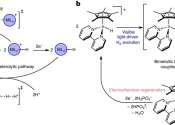Coffee grinder, old tires spur creation of sulfur-free oil
Using a coffee grinder, a freezer and a furnace, researchers have discovered a chemical synergy between scrap tires and polystyrene can be harnessed to create sulfur-free, light oil.

Using a coffee grinder, a freezer and a furnace, researchers have discovered a chemical synergy between scrap tires and polystyrene can be harnessed to create sulfur-free, light oil.
Materials Science
Apr 17, 2024
0
1

A team of chemistry researchers at the University of North Carolina at Chapel Hill has developed a unique approach to harnessing the sun's energy to produce hydrogen gas, a potential clean energy source, from water, according ...
Analytical Chemistry
Mar 26, 2024
0
95

Microalgae, including cyanobacteria and green algae, represent the most important biological systems for producing biomass and high-value products. It is estimated that microalgae can fix about 90 billion tons of carbon dioxide ...
Biotechnology
Mar 25, 2024
0
15

Ammonia (NH3) is an important molecule with many applications. The end product of the famed Haber–Bosch process, it is commonly synthesized to capture nitrogen for fertilizers, and is used for refrigeration, in cleaning ...
Materials Science
Mar 13, 2024
0
9

A Special Issue of the Journal of Exposure Science & Environmental Epidemiology co-edited by Yale School of Public Health Associate Professor Dr. Nicole Deziel, Ph.D., presents the latest research on exposure, health, and ...
Environment
Mar 6, 2024
1
1

E. coli bacteria and an electronic device might seem to have little in common, but in a recent experiment, University of Maryland researchers linked them into the first closed-loop system able to communicate across the technological–biological ...
Cell & Microbiology
Mar 5, 2024
0
1

Nano zero-valent iron (nZVI) is often used to remove chromium (VI), a heavy metal contaminant, because of its large specific surface area and high reducing activity. However, its effectiveness in removing trace heavy metals ...
Analytical Chemistry
Mar 4, 2024
0
1

The World Health Organization (WHO) has identified antibiotic resistance as one of the greatest threats to human health and life. With the alarming rise in antibiotic-resistant bacterial pathogens and the decline in antibiotic ...
Biotechnology
Dec 29, 2023
0
3

Global industries focused on carbon neutrality, under the slogan Net-Zero, are gaining increasing attention. In particular, research on the microbial production of polymers, replacing traditional chemical methods with biological ...
Polymers
Dec 27, 2023
0
10

A study published in the Chemical Engineering Journal describes a strategy to produce a material based on zinc oxide (ZnO) capable of degrading sertraline, an antidepressant that has been detected, like other drugs, in groundwater ...
Analytical Chemistry
Dec 19, 2023
0
96
In the field of engineering, a chemical engineer is the profession in which one works principally in the chemical industry to convert basic raw materials into a variety of products, and deals with the design and operation of plants and equipment to perform such work. In general, a chemical engineer is one who applies and uses principles of chemical engineering in any of various practical applications; primarily with respect to the study of the design, manufacture, and operation of plant and machinery in industrial chemical and related processes. However, modern chemical engineers are becoming more heavily involved in the development of new technologies such as fuel cells, hydrogen power and nanotechnology, as well as working in fields such as polymer engineering and biomedical engineering. A number of famous or historical chemical engineers can be found in the list of chemical engineers.
This text uses material from Wikipedia, licensed under CC BY-SA